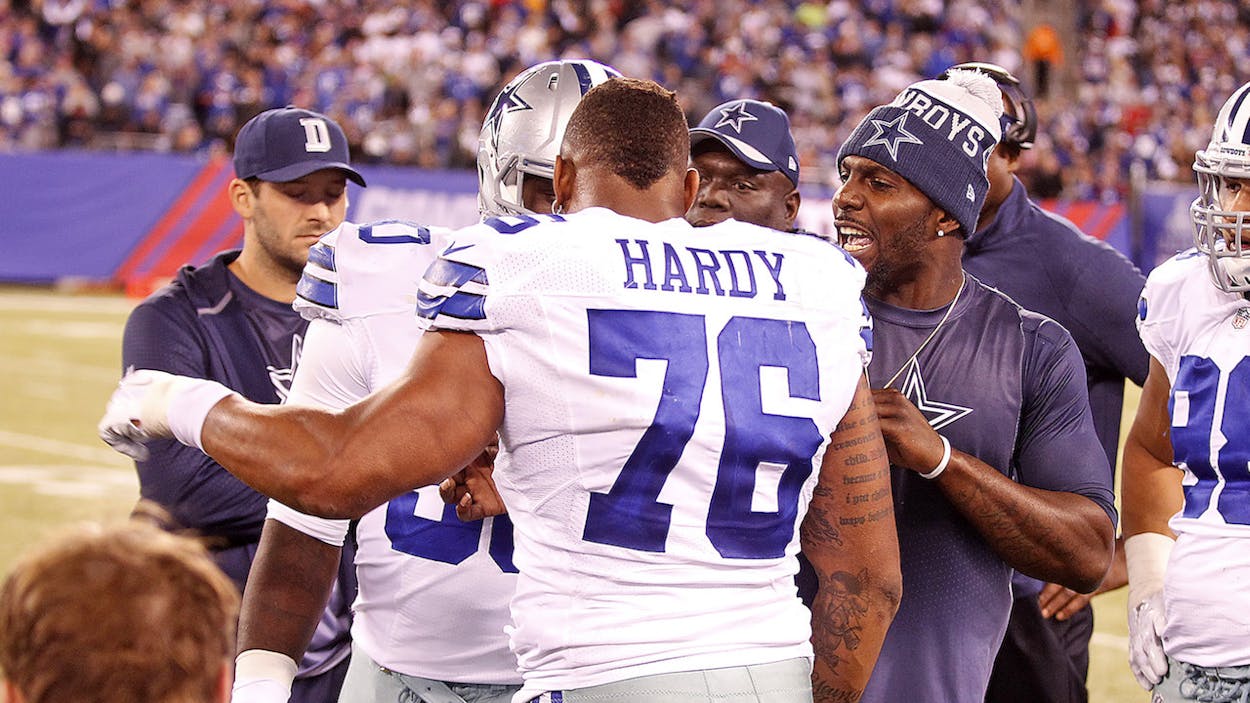We don’t know for sure what happened between Johnny Manziel and his girlfriend after the former A&M star was pulled over in suburban Cleveland. Witnesses called 911 because Manziel’s car was reportedly driving recklessly, speeding at over 90 miles an hour while the current Cleveland Brown was arguing with his girlfriend.
What happened next is unclear. According to the police report, Crowley told the officers that Manziel “pushed her head against the glass of the car” and that he “hit her a couple times.” The report concluded that the friction burn on Crowley’s arm was caused when Manziel grabbed her to keep her from jumping out of the moving car. Crowley walked back on her statement to officers that Manziel hit her, explaining on social media that “it was just an argument, it was private, and we are all good.”
The NFL’s Ian Rapoport tweeted this morning that the league won’t be disciplining Manziel for the incident. The league has since come out and clarified that the quarterback’s investigation is ongoing, but it has been widely speculated that he will not be punished.
Dallas Cowboys defensive end Greg Hardy, however, will definitely not be disciplined for an incident on Sunday. After the Giants returned a kickoff for a touchdown in the fourth quarter, an irate Hardy stormed onto the field, shoving teammates and one of his coaches before being escorted to the sidelines where cameras captured him getting into it with Dez Bryant. The NFL left Hardy’s punishment up to his team, and the Cowboys opted to reward him with talk of a contract extension.
If Manziel isn’t punished after the investigation concludes, that might be fair. If the organization doesn’t believe that Manziel did anything wrong, they have the right to support their player. Similarly, if the NFL believes that what happens between a player and his teammates and coaches during a game is best left to the team to handle, that’s a reasonable policy.
At least those things would be reasonable if the things that the league feels the need to get involved in weren’t so surprising. Such as fining Pittsburgh Steelers safety William Gay nearly $6,000 for wearing purple cleats last Sunday, a gesture the player—whose mother was killed by his stepfather when Gay was seven-years-old—offered as part of Domestic Violence Awareness Month.
Gay isn’t the only NFL player this week who received a fine for a uniform violation this weekend. D’Angelo Williams, Gay’s teammate on the Steelers, was slapped with a $5,787 fine—this one for wearing “We Will Find A Cure” and a pink Breast Cancer Awareness ribbon on his eyeblack.
The NFL is famous for penalizing players for uniform violations, of course. Players who wear the wrong color shoes or socks, or who wear unauthorized messages on their accessories, have received collection envelopes in their lockers for a long time. So it’s not like Gay or Williams didn’t know that they were breaking a rule.
But all of this also speaks directly to the NFL’s values. The league claims to have them—it pumps money into campaigns like #NoMore, which aims to get men involved in domestic violence prevention, and every October, players on every team wear pink accessories to show support for Breast Cancer Awareness Month. But the fact that it only allows players to speak out—even for the causes that the NFL has opted to take a stand on—in very specific, authorized (and easily monetized) ways is telling.
So it’s strange that the NFL doesn’t feel the need to take action against Manziel and Hardy, but entirely empowered to go after Gay and Williams. It might be the right decision in Manziel’s case. It’s possible that the league just doesn’t know enough about what happened to issue discipline, or that, against all odds, it will discipline the player. It’s possible that in Hardy’s case the NFL doesn’t feel like his behavior warrants league intervention, and the Cowboys need a pass rusher with three sacks, eight tackles, and a forced fumble in two games more than they need to protect their players and coaches from someone prone to getting violent with them when he’s upset.
But it’s hard to believe that those things are true, and also that Gay and Williams need to be fined for wearing anti-breast cancer and anti-domestic violence messages onto the field. Yet that’s exactly what the NFL believes, based on how it’s chosen to dole out its discipline.
There are legitimate questions about what role the NFL has in policing and disciplining domestic violence on the part of its players. There are questions about whether that discipline should be formal—the long suspensions and potential lifetime bans that the league instituted after the Ray Rice incident last year—or left to the teams to determine in a “free market” system that places the responsibility on the organizations that bring those players in. But there’s no question that a league that considers wearing purple shoes to promote a worthy cause to be an actionable offense, but throws its hands up at the behavior of Hardy and Manziel, has its priorities out of whack.








